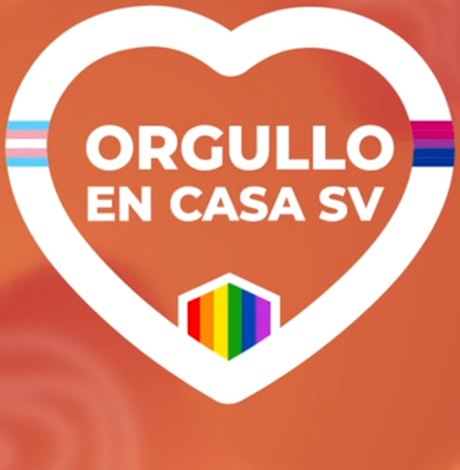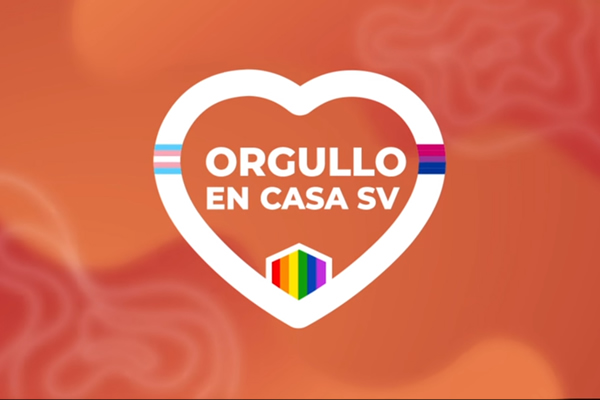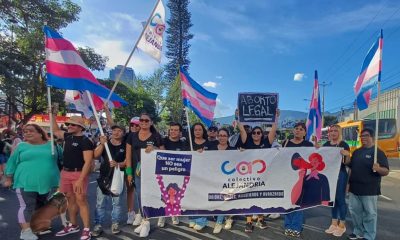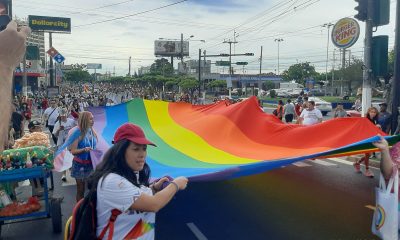World
Se celebró el Orgullo LGBTQ en El Salvador desde casa
El Salvador G organizó una celebración virtual


SAN SALVADOR, El Salvador — El Orgullo LGBTQ en El Salvador, se celebró en Internet al igual que en el resto mundo este año; debido a la pandemia que se está viviendo a nivel mundial, todas las instituciones que se encargan de la organización de la marcha en sus respectivos países comenzaron a tener reuniones virtuales para sondear la manera en cómo se podía solventar la celebración y mostrar el orgullo de manera virtual, sin exponer a nadie a salir a las calles como cada año.
En El Salvador, muchas de las organizaciones LGBTQ que están conglomeradas en la Federación Salvadoreña LGBTI han dedicado más tiempo a solidarizarse en la recolección de víveres y artículos de primera necesidad para apoyar a sus bases que se han visto afectadas, tanto por la pandemia, al igual que por las tormentas que han azotado al país. Una de estas organizaciones es Asociación Entre Amigos.
“Hemos estado trabajando en las emergencias, que no hemos tenido ni oportunidad de pensar que es junio, pero como Federación se realizó algo, al igual que otras organizaciones compañeras”, comentó al Washington Blade, William Hernández, director de Asociación Entre Amigos.
Por ello El Salvador G, un portal salvadoreño que se ha destacado durante 11 años como medio de comunicación de la población LGBTQ y al mismo tiempo siempre han participado de la celebración del Orgullo LGBTQ en el país, este año fue el encargado de llevar la celebración de manera digital.
“Desde febrero comenzamos a tener reuniones virtuales con nuestros pares organizadores del Pride en otros países, para ver cómo iban solventando en ese momento, como Australia y otros más”, informa al Blade, Nicolás Rodríguez, director de El Salvador G. “Propusimos que no se cancelaran las marchas, sino que se pospusieron a finales de año para aquellos países que no tienen invierno en esa época”.
Al tenerse una respuesta favorable de diversos colegas organizadores se acepta la cancelación en junio toda celebración de calle y se traslada a nivel virtual, “por ello se realizó el 27 de junio el Global Pride a nivel internacional, en donde El Salvador tuvo su participación por la noche y El Salvador G, lo transmitió en vivo”, comenta al Blade Rodríguez. “De ahí nace la idea de una maratón de videos llamada #OrgulloEnCasaSV, proyecto al cual se han sumado colectivos de artistas, colectivos de ONG’s, entre otros, por lo cual ha sido muy utilizado el hashtag”.
En esta iniciativa a través de la página de Facebook de El Salvador G, se estuvieron presentando diversas entrevistas en vivo a organizaciones, a gente histórica en el movimiento de El Salvador, que han contado un poco de la incidencia que se ha venido haciendo con el pasar del tiempo.
“La iniciativa de El Salvador G es muy buena, nosotras participamos de un conversatorio que se realizó y también con videos para El Orgullo en Casa SV”, expresó en una pequeña entrevista con el Blade, Karla Guevara, directora ejecutiva de la Asociación Colectivo Alejandría.
Por su parte COMCAVIS TRANS junto al Centro Cultural de España en El Salvador trabajaron en una muestra fotográfica virtual titulada “Diversificando nuestra existencia con el Orgullo”, para lo que la directora ejecutiva de la organización, Bianca Rodríguez, comentó al Blade que, “con este portafolio se pretende mostrar la situación de precariedad en que se encuentra inmersa la población bajo diferentes temáticas como el desplazamiento forzado, su cotidianidad, la situación laboral por el COVID-19, entre otros”.
De esa manera se visibilizó otro rostro del día del Orgullo, con las diferentes realidades que las personas LGBTQ, en especial personas trans, viven en El Salvador; al mismo tiempo se reivindica la existencia de cuerpos diversos y las diferentes expresiones del amor entre las personas, la muestra fotográfica aún está en línea a través de la página https://www.comcavistrans.org/.
El Ministerio de Cultura del Gobierno de El Salvador, presentó junto a la embajada de la República de Cuba y con el apoyo de la Asociación ASPIDH Arcoíris Trans, la 3ª Muestra Digital de Cine LGBTIQ+ El Salvador, la cual se presentó del 26 al 30 de junio, todas las producciones eran para un público mayor de 21 años, los enlaces para ver las películas eran solicitados por medio de mensajes privados al Facebook del Ministerio a las 8:00 p.m. de las fechas establecidas.
La muestra se inauguró con el estreno salvadoreño titulado “SoulMeet”, un corto de ficción dirigido por Jesús Vanegas; además, el documental salvadoreño “Rosa”, que fue considerado el mejor documental independiente en el Festival de Cine Independiente en New York, en 2006, el cual fue dirigido por Erika Saca, Chiki Vásquez y Orlando Álvarez.
A esta visibilidad en redes sociales, también se sumó la Iglesia Episcopal Anglicana de El Salvador, quienes del 22 al 27 de junio estuvieron publicando reflexiones bíblicas hechas por personas LGBTQ que pertenecen al Ministerio de Diversidad Sexual de la misma, cerrando el 28 de junio con una Eucaristía en línea dedica al Orgullo LGBTQ, en donde la predica principal fue dada por el coordinador de dicho ministerio y las oraciones llevadas por parte de las chicas y chicos del mismo.
Por medio de videos y un escrito, la Federación Salvadoreña LGBTI mostró su posicionamiento ante la conmemoración virtual del 28 de junio; video en el cual presentan datos históricos del porqué de la marcha en el país, al igual cifras de asesinatos a personas LGBTQ en el país, 145 registrados entre 2016 y 2018 y solo en los primeros meses de 2020 se registraron 4 asesinatos de personas gays y trans; según datos de la Secretaria de Inclusión Social a través de la Dirección de Diversidad Sexual, entes clausurados por el gobierno de Nayib Bukele.
Y aunque toda celebración de la diversidad existente y la reivindicación se trasladó al ámbito virtual este 2020, el objetivo principal sigue siendo el mismo,
“Las marchas han servido no solo para celebrar nuestra vida, sino también para manifestarnos y demandar nuestro reconocimiento como ciudadanas y ciudadanos que indistintamente de nuestras orientaciones sexuales, de nuestra identidad y/o expresión de género, somos seres humanos a quienes se nos debe garantizar el ejercicio pleno de nuestros derechos”, expresó en un vídeo compartido por la Federación Salvadoreña LGBTI, Erick Ortiz, coordinador general de Colectivo Normal y pre candidato a diputado por Nuestro Tiempo.

The Mexican Senate on Thursday approved a bill that would ban so-called conversion therapy in the country.
Yaaj México, a Mexican LGBTQ rights group, on X noted the measure passed by a 77-4 vote margin with 15 abstentions. The Chamber of Deputies, the lower house of Mexico’s congress, approved the bill last month that, among other things, would subject conversion therapy practitioners to between two and six years in prison and fines.
The Senate on its X account described conversion therapy as “practices that have incentivized the violation of human rights of the LGBTTTIQ+ community.”
“The Senate moved (to) sanction therapies that impede or annul a person’s orientation or gender identity,” it said. “There are aggravating factors when the practices are done to minors, older adults and people with disabilities.”
Mexico City and the states of Oaxaca, Quintana Roo, Jalisco and Sonora are among the Mexican jurisdictions that have banned the discredited practice.
The Senate in 2022 passed a conversion therapy ban bill, but the House of Deputies did not approve it. It is not immediately clear whether President Andrés Manuel López Obrador supports the ban.
Canada, Brazil, Belgium, Germany, France, and New Zealand are among the countries that ban conversion therapy. Virginia, California, and D.C. are among the U.S. jurisdictions that prohibit the practice for minors.
South America
Argentina government dismisses transgender public sector employees
Country’s Trans Labor Quota Law enacted in 2021

Protests have broken out across Argentina in recent weeks after the dismissal of transgender people from their government jobs.
President Javier Milei’s action is in stark contract with the progress seen in 2023, where the government’s hiring of trans people increased by 900 percent within the framework of the Trans Labor Quota Law that had been in place since 2021.
Among those affected is Sofia Diaz, a “survivor” who shared her testimony with the Washington Blade hours after she traveled from Chaco Province to Buenos Aires to protest her dismissal.
Presentes, an LGBTQ news agency, reported the government dismissed more than 85 trans employees in less than two weeks.
Diaz, 49, holds a degree in combined arts. She joined the National Social Security Administration (ANSES) in 2022 under the Trans Labor Inclusion Law. The layoffs began in January and left many people feeling uncertain and anguished. It was her turn a few days ago.
Diaz in an interview recounted how the situation became progressively more complicated, with difficulties in accessing information about her employment status and the eventual confirmation of dismissals through WhatsApp messages. This government action, according to Diaz, violates the law.
“We were on a Friday, I think on March 24, in the office and we have a WhatsApp group of other colleagues from all over Argentina who entered through the trans labor quota and they tell us if we can get our pay stubs on the intranet,” Diaz recalled. “So, I tried to enter, I could not, I talked to two other colleagues and they told me no, they could not, and so we went to another person. He couldn’t either.”
“Some people told us that it could be a system error. Well, we were never calm, let’s say not how this issue of installing fear and the perversion with which they do it ends,” she added. “This sadism of … inflicting pain and speculating with your misfortune and so on … is something that characterizes Javier Milei’s government.”
Diaz recalled a list of those dismissed from the agency began to circulate from the union in the afternoon. A colleague passed it on to her, “and well, unfortunately I was also on that list.”
“At that moment the whole weekend went by with anguish, crying, and talking with other colleagues from other places, not only trans, but everyone, everyone and everyone,” she said. “On Monday when we went to try to enter, we could not enter with the biometric, which is the thumb we had to use every morning to enter.”
Despite the difficult moment through which she is going, the trans activist stressed to the Blade that she will continue protesting and will even sue the government because her dismissal is illegal and “violates the constitution itself.”
The LGBTQ community and its allies have mobilized and organized demonstrations, highlighting the importance of defending the rights won and fighting against discrimination and exclusion. Diaz emphasized the fight is not only for the people affected today, but also for future generations, saying the historical memory of the struggles for inclusion and social justice must be kept alive.
“The Argentine government thus faces a key challenge in human and labor rights, where public pressure and social mobilization can play a determining role in protecting the rights of LGBTQ+ people,” Diaz said.
Africa
For queer Nigerians, being on gay dating apps is still a risk
Homophobes target users for violence

Gay hookup apps like Grindr, and dating apps like Tinder and Bumble have managed to proliferate queer communities in countries like Nigeria.
Those who seek one night stands find what they want while those looking for love equally find what they seek. These platforms have managed to position themselves as safe spaces for queer people in anti-gay Nigeria. In recent times, however, it is proving to be unsafe, as homophobic people are quickly learning about the apps, and opening accounts that either seek to outrightly threaten queer people, or pretend to be queer, have long chats with gay people, invite them over, and inflict violence on them.
Take the case of Biodun, a queer Nigerian man who joined Grindr to meet up with guys like him.
After Biodun had built a connection and agreed to meet with someone whose display name was “Mamba,” they decided to meet up only for him to be met with violence. Apparently, Mamba ran a catfish account.
“I’ll never forget that day,” Biodun, who asked the Washington Blade not to use his last name because of safety concerns, said. “I still think about it, and sometimes blame myself for being very careless, even though Grindr was supposed to be our safe space.”
Biodun’s experience isn’t peculiar to him.
In Nigeria, draconian laws that criminalize same-sex relationships exist, making queer people turn to the digital realm to explore their identities and seek connections beyond the confines of societal oppression that comes with the physical environment. Gay dating apps such as Grindr, therefore, have emerged as virtual sanctuaries, offering spaces for queer Nigerians to forge friendships, find solidarity, and pursue romantic or sexual relationships. Spaces like this, however, have morphed into a landscape fraught with danger, as homophobic people have weaponized these platforms to perpetuate hate and violence.
“Sometimes, I often wonder how they learned about these platforms,” Daniel, which is not his real name, told the Blade. “You would think that it is just us in the platforms, until you find out that the accounts are rooted in homophobia.”
One time, someone’s bio read, “I’m only here to deal with the gay people. I know all of you, and I will find and kill you. We no want una for here (translates to we do not want you here, in English.)” It was a stark reminder that these spaces are no longer LGBTQ-friendly for Nigerians. In 2014, there was the passage of the Same-Sex Marriage Prohibition Act by former President Goodluck Jonathan, which not only criminalized same-sex unions, but also imposed severe penalties on anyone involved in LGBTQ advocacy or support.
This law catalyzed a surge in discrimination and violence against queer Nigerians; emboldening regular civilians, religious extremists, and even law enforcement agencies to target individuals perceived as deviating from traditional gender and sexual norms. Again, amid this hostile environment, gay dating apps emerged as lifelines for many queer Nigerians, offering avenues for discreet communication, community building, and the pursuit of intimate relationships.
The very anonymity and freedom these apps provided, however, became double-edged swords.
The advent of screenshot and screen-recording capabilities on these apps, for example, reduced the risks of exposure, strengthening the safety and privacy of users. However, this also comes with its own lapses, as queer people using Grindr have often relied on screenshots and screen recordings to confirm the identities of potentials with their friends, before accepting to meet.
“Before the removal of the screenshot option, I usually shared photos of others with my trusted friends,” Biodun shared. “But since that was taken off, there was no way for me to do that.”
Although, according to Grindr’s terms and conditions, the removal came with privacy concerns, as it was to facilitate a safe dating experience.
This erosion of digital safe spaces is depriving queer Nigerians of vital avenues for self-expression and affirmation,and is exacerbating the psychological toll of living in a society that continues to systematically demonize their identities. Moreover, the normalization of homophobic rhetoric and violence in both physical and digital realms has perpetuated a cycle of fear and oppression, and is reinforcing this notion that LGBTQ individuals are inherently unworthy of dignity and respect. Despite these challenges, though, the resilience of queer Nigerians continue to persist, as they defy societal norms and assert their right to love and be loved.
-

 State Department4 days ago
State Department4 days agoState Department releases annual human rights report
-

 District of Columbia2 days ago
District of Columbia2 days agoCatching up with the asexuals and aromantics of D.C.
-

 South America2 days ago
South America2 days agoArgentina government dismisses transgender public sector employees
-

 Politics5 days ago
Politics5 days agoSmithsonian staff concerned about future of LGBTQ programming amid GOP scrutiny












